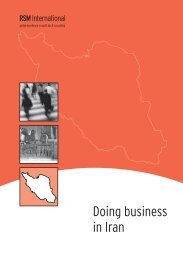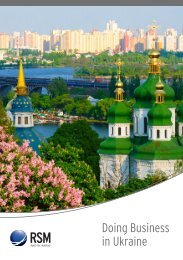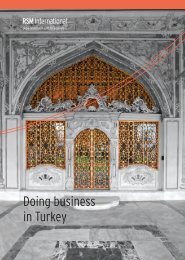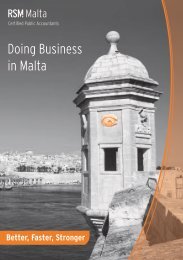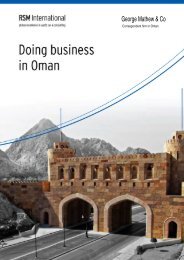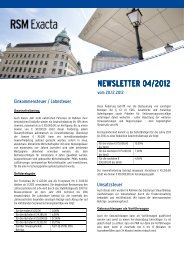Doing Business in India - RSM Austria
Doing Business in India - RSM Austria
Doing Business in India - RSM Austria
Create successful ePaper yourself
Turn your PDF publications into a flip-book with our unique Google optimized e-Paper software.
2.2 Language<br />
<strong>India</strong> is a land of many languages and dialects. H<strong>in</strong>di is the official language of the<br />
<strong>India</strong>n federation or union, while English is commonly used bus<strong>in</strong>ess language.<br />
English language is acceptable for all the legal, commercial and bus<strong>in</strong>ess<br />
documentation and communications.<br />
2.3 Religion<br />
More than 80% of <strong>India</strong>’s population is H<strong>in</strong>dus and around 13% are Muslims. The<br />
other major religious communities are Christian, Sikh, Buddhist and Ja<strong>in</strong>.<br />
2.4 Education<br />
Data published for 2001 census revealed that 64.80% of the total population are<br />
literate and consisted of 75.30% men and 53.70% women. Amongst the youth the<br />
literacy rate is 82%.<br />
3.0 GOVERNMENT AND POLITICAL SYSTEM<br />
3.1 Government Structure<br />
The <strong>India</strong>n federation or union is organized <strong>in</strong>to 28 states and 7 union territories<br />
with a s<strong>in</strong>gle and uniform citizenship and a s<strong>in</strong>gle judiciary. The capital of the <strong>India</strong>n<br />
government is the state of Delhi.<br />
<strong>India</strong> is a sovereign, socialist, democratic and secular republic with a parliamentary<br />
system of government, which is based on the U.K. parliamentary system. The<br />
parliament is headed by the President and consists of two houses - the Lok Sabha<br />
(the house of the people) and the Rajya Sabha (the council of states). Although the<br />
President is the constitutional head of the government, the real executive power<br />
resides with the Council of M<strong>in</strong>isters, with the Prime M<strong>in</strong>ister as its head. The Council<br />
of M<strong>in</strong>isters is collectively responsible to the Lok Sabha.<br />
The <strong>India</strong>n Constitution provides for the <strong>in</strong>dependence of other government bodies<br />
for certa<strong>in</strong> key areas like the judiciary, the Comptroller and Auditor General, the<br />
Public Service Commissions and the Election Commission.<br />
4.0 LEGISLATIVE AND LEGAL ENVIRONMENT<br />
4.1 Legislation<br />
<strong>India</strong>n Constitution divides the various responsibilities <strong>in</strong>to three categories: the<br />
Union list, the State list and the Concurrent list. Parliament can make laws on<br />
subjects <strong>in</strong> the Union list and the state legislature on subjects <strong>in</strong> the State list. Both,<br />
the parliament and the state legislature can make laws on the subjects <strong>in</strong>cluded <strong>in</strong><br />
the Concurrent list. This division helps <strong>in</strong> regulat<strong>in</strong>g the relations between the<br />
Union and the States.<br />
2<br />
DOING BUSINESS IN INDIA



